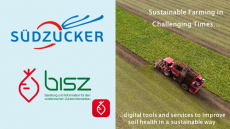BASF further expands GM cereal capabilities
and development programme designed to achieve genetically optimised
wheat.
The multimillion-dollar agreement on developing high yielding wheat that is more resistant to drought and fungal diseases has been signed with Australian research centre Molecular Plant Breeding CRC, one of the world's leading centres in molecular plant breeding research.
The € 17 million joint programme has been scheduled for seven years and involves 25 scientists based at MPBCRC.
"We are intensifying the cooperation with MPBCRC, because the results achieved to date have exceeded our expectations," said Dr. Hans Kast, president and CEO of BASF's plant biotechnology company.
"We are already one of the leading companies in the field of the discovery and use of agronomically important genetic traits. Through our intensified cooperation with MPBCRC, we are decisively extending this competence for wheat as well."
The initiative follows BASF's recent acquisition of CropDesign, a Belgian biotech company, that specialises on traits for yield-enhancement, drought tolerance and improved nutrient use efficiency of crops such as corn and rice.
BASF is clearly convinced that crops with higher yields will become increasingly important to meet the nutritional needs of a growing global population.
"In 15 years we will have close to eight billion people on our planet, almost 1.5 billion more than today," said BASF board member Peter Oakley.
"With lead times of 12 to 15 years in research we have no time to lose."
As part of the new joint research programme with MPBCRC, BASF Plant Science is making available its comprehensive collection of gene candidates for yield increase, drought tolerance and resistance to fungal diseases. MPBCRC will provide expertise and a patented technique for developing highly effective genetic modifications of wheat under typical agricultural conditions.
"BASF Plant Science has chosen MPBCRC as the best partner to undertake this most significant research and development program in genetic modification of wheat," said MPBCRC CEO Dr Glenn Tong.
"This is testimony to the fact that MPBCRC is an international centre of excellence in molecular plant breeding research."
After corn, wheat is the most frequently cultivated cereal in the world. Prolonged periods of drought can have a major impact on economies, causing double-digit percentage losses in yield not only in arid areas such as Australia but increasingly also in Europe.
Fungal diseases can also significantly reduce yields. Genetically modified wheat that can resist fungal attacks will help farmers use crop protection agents more efficiently.




















